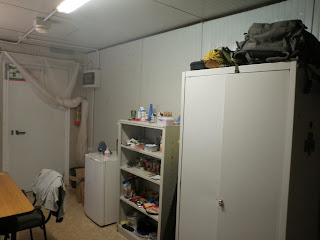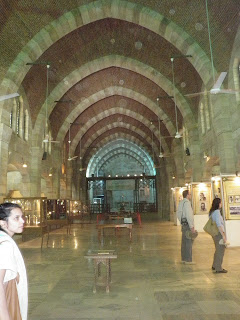Night time here is always tricky, but when the power goes out, it’s practically impossible to stay on the elevated path.
And that is the secret, because if you step off of the path there are snakes and a giant lizard the size of a large dog (but not as tall) ....
Apparently, its teeth are poisonous, but it is only aggressive if you approach it in a threatening manner. I wonder if it may misinterpret fear as aggression? I am not taking any chances and have correspondingly reduced my nightly liquid consumption!
And that is the secret, because if you step off of the path there are snakes and a giant lizard the size of a large dog (but not as tall) ....
Apparently, its teeth are poisonous, but it is only aggressive if you approach it in a threatening manner. I wonder if it may misinterpret fear as aggression? I am not taking any chances and have correspondingly reduced my nightly liquid consumption!
I can now comfortably sleep with my container temp in the mid 20s. The days reach highs in the mid 40s. The evenings can go down to 17 degrees.
I keep my air conditioner on all day and find that a few times a day I still have to sit in the air conditioning for at least five minutes before I can continue with my day!
When the power goes out my container becomes a huge oven; it’s impossible to stay inside it, with the power out, between the hours of 0800 – 2100.
At night, the thing I find the most striking is the smell. It is a mix of dirt and burning garbage (the most common method of garbage disposal here). During the day it also smells, but it is as if the daytime heat brews the mixture and then the decrease in temperature at night allows it to spread freely in the air.
Or, perhaps, I just take more time to stop and register the smell in the air at night as I search the sky for stars.
I have started to walk the parameter of the camp and into town at night with a friend; it is a lovely way to end a day and live the true pulse of Africa .
It is so quiet, except for the ubiquitous sounds of generators and the occasional boisterous, lively Ugandan music playing from shacks along the side of the road. Each person you pass greets you and wants to shake your hand. Everyone is outside, taking advantage of a slight breeze or decrease in temperature before returning to their tukuls for bed. Some compounds have electricity from 1900-2300, but none of the locals do.
 |
| One day, while out for a Sunday afternoon drive, we stumbled on the most beautifully landscaped tukul community! |
They have built a power plant and power lines in Yambio. At some point in the future the locals will have access to electrical power.
I am not sure how this will factor into their tukul construction or what type of fire hazards it could present. I can’t help but think that, in some ways, it will be a move in the wrong direction.
For now, at night, everyone gathers outdoors and visits, plays games, and drinks as a community.

Coming from a society with all modern comforts imaginable, it is easy to observe that they, without many conveniences, are currently doing something very right here.
And I’m sobered by the thought of what they may loose with the addition of electricity to this village.

Coming from a society with all modern comforts imaginable, it is easy to observe that they, without many conveniences, are currently doing something very right here.
And I’m sobered by the thought of what they may loose with the addition of electricity to this village.
The money here is impossibly dirty. So dirty that you can’t tell how much it’s actually worth! Everything is dirty here, but the money feels gritty and turns your hands and all that it touches black.
It actually feels thicker than it is due to the layer of caked on dirt and God knows what else. I could never imagine that money could be so dirty.
The Romanians have it right, they have plastic money. It is clean and practically impossible to break! I hear our first Canadian plastic bills will be out soon as well.
One, two, and five Sudanese pounds (Canadian 30 cents, 60 cents, and $1.50 respectively) are the working currencies on the street and at the market. All items are placed on the ground in little piles and each pile costs a different amount. For a pound you can get: three breads (round or long), three lemons, a clove of garlic, and four/five little bananas.
Two pounds will get you: five tomatoes, four potatoes, five onions, three oranges. Pineapples are ten pounds (at this time of year because they are not in season). Cabbage is eight pounds. A 1 kg chicken is 25 pounds.
A box of 24 waters is 35 pounds. A carton of cigarettes (ten packs) is fifteen pounds. A bottle of wine is 60 pounds. A case of 24 beers is 75 pounds. These are the staples of our diets here in Yambio.
Two pounds will get you: five tomatoes, four potatoes, five onions, three oranges. Pineapples are ten pounds (at this time of year because they are not in season). Cabbage is eight pounds. A 1 kg chicken is 25 pounds.
A box of 24 waters is 35 pounds. A carton of cigarettes (ten packs) is fifteen pounds. A bottle of wine is 60 pounds. A case of 24 beers is 75 pounds. These are the staples of our diets here in Yambio.
Yesterday I began patrolling. My first patrol duty was town patrol. Normally this requires two trips into town and around the area, to the market, and through the streets to show the UN presence and to assess the security situation in town.
 |
| 16 March 2011 - Yambio Team Site UNMOs! |
We also had three flights arriving and taking off (including one air patrol),
so we actually spent most of the day at the airfield instead.
I have been going into town with the patrol each day for something to do, but today was the first day that I was actually on duty and driving – the fun begins! I will describe driving conditions in this part of the country in another email; there are some pretty interesting differences toKhartoum
 |
| The Yambio Airstrip |
 |
| Yambio Passenger Terminal. |
We also had three flights arriving and taking off (including one air patrol),
so we actually spent most of the day at the airfield instead.
I have been going into town with the patrol each day for something to do, but today was the first day that I was actually on duty and driving – the fun begins! I will describe driving conditions in this part of the country in another email; there are some pretty interesting differences to
The curiosity in the eyes of the local children and adults is palpable. They cautiously observe us, especially when we are in an area where they don’t often see UN or vehicles.
Even in town, they wait until we acknowledge them with a smile or wave, and then their faces break out into the friendliest smiles you can imagine -- huge grins from ear to ear accompanied by gentle waves. They are truly beautiful when they smile and it makes you want to help them just that much more. It strikes something deep inside you and you want to do more than you possibly can. The kids are unbelievable, and so happy; some playing naked in the dirt, some walking around holding hands between classes, all trying to figure out what to make of me -- priceless.
















































